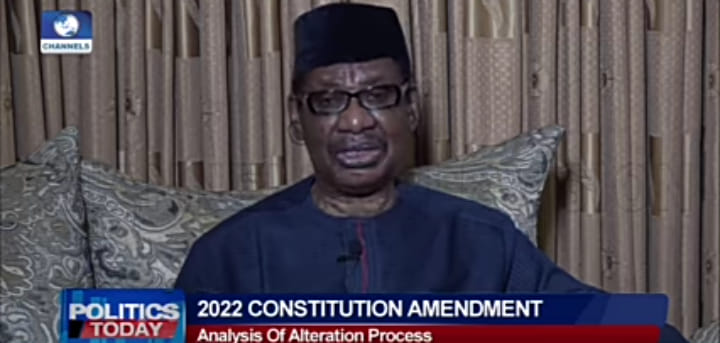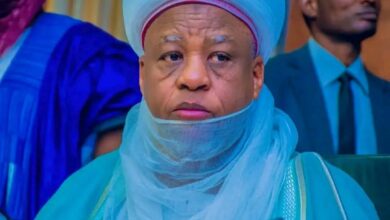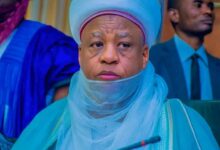CONSTITUTION AMENDMENT: Prof Itse Sagay tears National Assembly down for sneaking “illegal” provisions into amended Electoral Bill

*Says lawmakers always have culture of passing laws not for law, people but themselves
*Tells what the legislators should have done on Local Government matters passed
*Backs NASS on State of the Nation Address and failed Bills on women
*Justifies for Buhari’s demands on Electoral Bill
…plus fLASHBACk to what he said about PACAC, Ban on Open Grazing in South
By BASHIR ADEFAKA

“What I noticed is that our National Assembly, particularly, not only want to be a law making body, they want to be judicial body. Because, this is judicial power they are trying to wield. They also want to be an executive body because, they would pass resolution and want it to be binding, whereas, it is merely suggestion, merely recommendation to the executive, but they want it binding.”
Nigeria’s legal icon and Chairman, Presidential Advisory Committee Against Corruption (PACAC), Prof Itse Sagay (SAN) is not in agreement with National Assembly’s use of the word ‘summon’ on President of Nigeria, saying it is unacceptable.
Sagay, who was speaking on Channels Television Politics Today on Tuesday, also expressed his mind on the matter of Local Government, describing legislative at National Assembly level about council administration as a waste of time because, he said, doing should be a state affair and had no business in the Federal Constitution.
Saying the National Assembly concentrated on irrelevant things, including Local Government matters, the legal luminary said “A lot of time was spent on bills that were totally irrelevant with regards to Local Government. We should not be talking about Local Government in the Constitution.”
Sagay, who started his response to Segun Okinbaloye, anchor of the interview programme in the television interview monitored by The DEFENDER, by rejecting the attribution of a Constitutional Lawyer, was joining from Lagos to discuss a topic, ‘Analysis of NASS Alteration Process’, faulted the process employed by the legislature in the constitutional review ongoing.
“I have gone through most of the items which the National Assembly has taken up and unfortunately, it has conformed with what I have felt about their modifications of the constitution,” he said during the show on Tuesday.
“They are totally irrelevant to our needs at the moment. What is necessary and what is causing a lot of problems in the country is the question of restructuring — the question of having true federalism. They have not touched that at all.”
Explaining that the country should be interested in talking of a funding formula for the federation, he said:
“We should retain the provisions of the 1963 constitution under which regions, now states, retained 50 percent of its resources, sent 20 percent to the Federal Government, and sent 30 percent to a distributable pool — to be distributed among the states of the federation in accordance with your level of sufficiency in terms of provisions,” the legal personnel noted.
“Under the distributable pool, the least able state — the poorest state — gets more from that pool. Every state, even the rich ones, also get some. Under that formula, 50 for the state, 20 for the Federal Government, 30 to the distributable pool.”
Sagay also said most of the debates around the local government in the constitutional amendment are irrelevant.
“What they should discuss is total removal of the provisions of the local government from the constitution. The constitution shouldn’t tell us what we should do about our local governments. It should not contain a list of our local governments,” he added.
“Local government is a state matter. 100 percent, it is a state matter. It has nothing to do with the Federal Government. When you talk about the funding of local governments — how to create a special account for LG separate from the state governments — they are irrelevant; it shouldn’t be in the constitution at all.”
On the National Assembly’s power to summon the President and Governors, Professor Itse Sagay declined his consent.
“I don’t like that ‘summon’. You don’t summon your Head of state. The Head of State is the number one citizen of the country. He is our representative at the international level and he has to be respected. You cannot summon him. I think these our Houses of Assembly and National Assembly should be very careful of the sort of mentality they have and some of the Language they use.
“If they say ‘invite’, you can invite but you don’t need to make it compulsory. A Head of State, who is in tune with the way the country is being run and has an interest in the way this country should be governed, will respond positively to genuine invitation by any Assembly, whether National or State.
“But to say you want to have power to ‘summon’, you want to turn the Head of State into your subordinate, that is sort of mentality that I detest and I don’t agree with that,” he said.
State of the Nation Address
Sagay, however, agreed with the clause about the need for State of the State Address for the state and the State of the Nation Address for the Federal saying, “Oh! That is that there should be a State of the State Address and State of the Nation Address. Yeah, I think it’s a good idea. That will give the chief executive at both federal and state level the opportunity of explaining what they have done during their tenure and what they plan to do and to use that opportunity to invite both the legislators and, even, the ordinary citizens in achieving these state objectives. I think that is a positive decision.”
Failed Bills on women
On whether it is not the case that Nigerian laws are not insensitive about women affairs when the bills on women failed to sail through except one, Sagay was not particularly as emotional as some Nigerians would be about it when he said:
“We have seen that even in level playing field, our women still cannot compete with our men for all reasons. But some of the reasons I hear is that meetings are held at nights and that women cannot attend such meetings, which is fair enough. I think what the National Assembly should have done would have been to make provisions for a certain percentage of seats for women in the legislatures so that, whether they contest with men or not, they will be guaranteed that minimum number of seats. So that extent, I think, the House that rejected the Bill was wrong.
“But I don’t know how many seats they were trying to get. Maybe somebody proposed too many seats. If the seats are too many, that could be a discouraging factor, otherwise, the principle is that women should be guaranteed minimum number of seats.”
Lawmakers can’t assume powers of Executive, Judiciary
On the clause of the Bill passed to criminalise or make an offense for anybody summoned by the National Assembly to fail to show up, the legal luminary refused to consent to it.
“No, I think that is definitely reprehensible. It will be abused.
“What I noticed is that our National Assembly, particularly, not only want to be a law making body, they want to be judicial body. Because, this is judicial power they are trying to wield. They also want to be an executive body because, they would pass resolution and want it to be binding, whereas, it is merely suggestion, merely recommendation to the executive, but they want it binding.
“So, they want to take executive decisions that are binding and now they want to be members of the judiciary by having people arrested and tried, simply by the fact that such people did not appear when they were invited. And it could be that by the time they were invited the time was not convenient for them or they had some more important national assignments.
“My experience is that, the National Assembly has never been satisfied with explanations. No. That power will be abused and it is a judicial power. I am against it.”
Justification for Buhari’s demands on Electoral Bill
Many issues were trashed during the interview but one other important one was the one regarding whether or not there is a constitutional conflict with the Electoral Act on the Section 84 (12) which the President raised and for which he wrote back to the National Assembly to be amended. It was discussed whether or any sitting political appointees, who is willing to run for office, should resign is in conflict with their human rights or their rights of franchise.
“I want to start by saying that the National Assembly has a big problem that is that, whatever they do, they must provide something for themselves. They don’t have a culture of passing a law for the sake of that law or for the sake of the people. They must also insert something – in everything they are doing – for themselves and that is what is causing all this confusion.
“First we had the Electoral Bill which was supposed to go to the President for signature, they added Direct Primaries for themselves to be given an advantage over governors and so on. Personal! They put it there. The President objected to it to say ‘Please, remove it and send it back without Direct Primaries provisions and I will sign’.
“What did they do? They went back to the whole habit again, they now brought in a new provision, which will compel government appointees in the executive to resign before they contest election, again, for themselves! So that they can they can increase their own chance of success in an election at the expense of those appointees.
“That was why the President, again, hesitated signing it and I think he was very generous to have signed that Bill. If I were the President, I would not sign it. I would send it back to them to remove that section making it compulsory for appointees in government to resign, because that was not in the Bill. It was just done for their own self interest.
“Now, on the issue of the Constitution, the Constitution also provision in that respect, that is 30 days. The Constitution provides 30 days for those who are appointees of government to resign if they are contesting election and the law is very clear. Once the Constitution has made a provision, any other provision is illegal, null and unenforceable. We have a series of Supreme Court cases on this point: You cannot add to, you cannot improve and you cannot reduce. Anything that has been put in the Constitution must be applied exactly as it is stated in the Constitution.
“What they are trying to do is an amendment of the Constitution by normal Bill. That is illegal. The Electoral Bill was a normal Bill. It was not a Constitutional Review Bill. So, to introduce a provision which tints the Constitution, which it has done, is illegal.
“So, frankly, whether they go back to change it or not, if I am contestant and I am an appointee in government, I will resign 30 days to an election and go and contest that election and I will anybody trying to challenge me because of an illegal provision that is quietly sneaked into an Electoral Bill.
“So, in my view, they (National Assembly) have a moral duty to remove that provision and if they don’t remove it, let all those affected by it go on and enforce their election rights in accordance with the Constitution, not in accordance with an illegal provision in the Electoral Bill,” Professor Itse Sagay spoke on the provisions of law and state of the nation in the Channels Television’s Politics Today interview programme on Tuesday.
FlashBack
Recall that on 24 May 2021, Professor Sagay had cleared the air on rumour about the status of Presidential Advisory Committee Against Corruption (PACAC) he heads being that it was rumoured that President Buhari either scrapped or was going to scrap it, in a similar Politics Today’s interview during which he also spoke in details about Southern Nigerian governors declaration of ban on open grazing.
On status of PACAC, he said, “It is extremely active. We are conducting lots of seminars online. We are also now moving into the states trying to bring all the developments that have been impacted at the Federal Level into the various states’ level. We have been to about 20 states so far. We have lots of activities going on right now. We will not be slowed down at all by any rumour.”
On Southern Governors resolution and ban on Open Grazing
“Well, to start with, I have been advocating ranching as the only way out for cattle herding since 2011. I was one of the first persons to talk about it until it became a very topical element and until the actual activities of some of the herders created essential threats to many communities, particularly in the South. So, I have been involved in thinking about what to do in the situation.
“Frankly, I don’t think the declaration is sufficient. The governors have to go back to their individual Houses of Assembly and introduce motions the way Benue State did and actually passed a law on banning grazing as it is taking place now and instituting ranching as the only alternative. There is need for that. A proclamation is not enough unless they already have laws, which give powers to the individual governors to simply proclaim, which I don’t think is the case.”
Asked if what President Muhammadu had said about the matter was invariably and simply that the position of the governors of the South was mere words and does not hold water legally, the Presidential Adviser said he could not really explain what the President had in mind adding that it was only those who went with him issuing that statement.
“But what I’m saying is that, for this announcement of banning of open grazing to be effective, there is need for the various States’ Houses of Assembly’s consent to actually pass a law banning open grazing. They need to do that.
“This, for me, legally is a declaration of intent but it should be followed by a legislation in the individual states’ Houses of Assembly of these Southern states.”
Asked by Seun Okinbaloye, who anchored the interview programme, to clarify if the Professor of Law was trying to say the governors’ saying that “across the Southern states you cannot by foot rear cattle into the South states”, that anybody caught after their statement cannot be prosecuted under any relevant law, legally speaking, Professor Sagay said:
“You put your finger on it. You arrest a person for open grazing, under what law would you have arrested him, under what law would you prosecute him? So, that was why I said it’s a statement of intent. You have to carry on and actually pass laws prohibiting open grazing the way Benue State has done.”
On whether there is anything different from what President Buhari said giving order of ‘shoot at sight’ of criminal herder and what the governors said seeing the decision of the President to be that “the decision of the governors is questionable legally”, Sagay said:
“The two statements may be related but they are not the same. The governors are actually working on proscribing open grazing. What the President was talking about was anyone carrying an AK47 without permission. We all know that the herdsmen, particularly the criminal herdsmen carry AK47 and so they are affected. But that statement by the President affects anybody, who carries an AK47 openly without authority to carry it. So, the two statements are different although related in a sense.”









